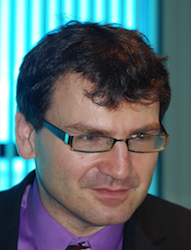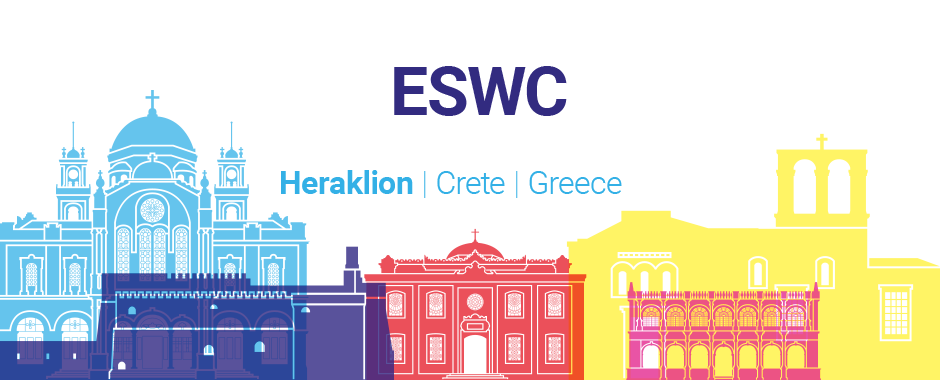Panelists
Dieter Fensel
“The ESWC community has contributed significantly to the development of the Semantic Web over the last 20 years and I’m looking forward to seeing what will emerge from our discussions at ESWC 2023 and beyond.”
In 1989, Dieter Fensel earned both his Master in Social Science (Free University of Berlin) and his Master in Computer Science (Technical University of Berlin). In 1993, he was awarded his Doctoral degree in Economic Science, Dr. rer. pol. (Doctorate on Political Science), from the University of Karlsruhe. In 1998 he received his Habilitation in Applied Computer Science. Throughout his doctoral and post-doctoral career, Prof. Dr. Fensel has held positions at the University of Karlsruhe (AIFB), the University of Amsterdam (UvA), and the Vrije Universiteit Amsterdam (VU).
In 2002, he took up a Chair of Computer Science at the University of Innsbruck, Austria. In 2003, after receiving a large grant acquired from the Science Foundation Ireland (SFI), he founded the Digital Enterprise Research Institute (DERI) at the National University of Ireland, Galway, and became the Scientific Director. In 2006 he created the Digital Enterprise Research Institute (DERI) at the University of Innsbruck, Austria, and became the Founding Director. In 2007, he established the Semantic Technology Institute International (STI2), which is organized as a collaborative association of interested scientific, industrial and governmental parties of the world wide Semantic Web and Service community that share a common vision. He is co-founder of several scientific events such as the European Semantic Web Conference Series (ESWC), http://eswc-conferences.org/, International Semantic Web Conference Series (ISWC), https://en.wikipedia.org/wiki/International_Semantic_Web_Conference and the TourismFastForward (TFF), http://tourismfastforward.com. He has been an executive member in more than 100 international and national research projects with a total volume of several hundred million euro; he worked as scientific or project coordinator in several of these projects. He is co-founder of the company Seekda (https://seekda.com), a multi-channel and direct booking solution, and Onlim (http://onlim.com), an online marketing tool.
Asunción Gómez-Pérez
“As a community we have achieved a lot. I’m really looking forward to reflecting with my esteemed colleagues on what we learnt and what our future directions will be”
Asunción Gómez-Pérez is Vice-Rector for Research, Innovation and Doctoral Studies, Fellow of the European Academy of Sciences (EurASc) since 2018 and Full Professor at Universidad Politécnica de Madrid (UPM). She was Head of the Department of Artificial Intelligence (since 2008), and she is Director of the Ontology Engineering Group (OEG) (since 1995), Academic Director of the Master’s Degree in Artificial Intelligence (since 2009) and Coordinator of the PhD Programme in Artificial Intelligence (since 2009) at the same University.
Asun was awarded a Bachelor in Computer Science (1991) and PhD in Computer Science (1993) for the Computer Science School at UPM. Master’s Degree in Administration and Business Management (MBA) for the Universidad Pontificia de Comillas ICADE (1994). She realized a postdoctoral stay at the Knowledge Systems Laboratory of the University of Stanford (1994-1995). She was Executive Director of the Laboratory of Artificial Intelligence in the Computer Science School at UPM (1995-1998).
She has received the Award ARITMEL – National Prize of Computer Science 2015, the Annual Award of Investigation of the UPM (2015) and the National Prize Ada Byron for the Technologist Woman in its second edition (2015). She has been recognized with an Award to the Best Ideas of Business XII actúaupm (2015) and the software OntOlogy Pitfall Scanner! (Opps!) was rewarded in the III Course of Commercialization of Technologies UPM by its business potential (2014).
Ian Horrocks
“The creation of web standards such as RDF, OWL and SPARQL was a major step forward in transitioning KRR from the lab into mainstream applications. This panel will be an opportunity for us to review the current State of the Art and see how we can build on that success.”
Ian Horrocks FRS is a professor of computer science at the University of Oxford in the UK and a Fellow of Oriel College, Oxford.His researchfocuses on knowledge representation and reasoning, particularly ontology languages, description logic and optimised tableaux decision procedures. After several years as a lecturer, senior lecturer, reader then Professor in Manchester, Horrocks moved to the University of Oxford in 2008.
Horrocks was jointly responsible for development of the OIL and DAML+OIL ontology languages, and he played a central role in the development of the Web Ontology Language (OWL). These languages and associated tools have been used by Open Biomedical Ontologies (OBO) Consortium, the National Cancer Institute (NCI) in America, the United Nations (UN) Food and Agriculture Organization (FAO), the World Wide Web Consortium (W3C) and a range of major corporations and government agencies.
Horrocks is the current editor-in-chief of the Journal of Web Semantics and has served as program chair for the International Semantic Web Conference (ISWC).In 2020 Horrocks was awarded the BCS Lovelace Medal in recognition of his significant contribution to the advancement of reasoning systems. Horrocks was elected a Fellow of the Royal Society (FRS) in 2011 and won the Roger Needham Award of the British Computer Society (BCS) in 2005.
Stefan Decker
“We have changed the world – but not nearly enough. AI is now real and agents exists – and Knowledge Graphs – to my surprise – are not as instrumental as initially thought.But they will have to be soon enough – and needed is a complete rebuild in the way we represent and distribute knowledge, beyond what we have done in the past. Looking forward to exchanging ideas and perspectives about the past and – more importantly – about the future.”
Stefan Decker is a professor at the RWTH Aachen University, and a Director of the Fraunhofer FIT Research Institute, part of the Fraunhofer Society.
Previously, he worked at the National University of Ireland, Galway and as the Director of the Digital Enterprise Research Institute and later Insight at NUI Galway (12 years), at ISI, University of Southern California (2 years, Research Assistant Professor and Computer Scientist), Stanford University, Computer Science Department (Database Group) (3 Years, PostDoc and Research Associate), and Institute AIFB, University of Karlsruhe (now KIT Karlsruhe) (4 years, PhD Student and Junior Researcher).
His main research field is the Semantic Web. Together with Ian Horrocks he worked on the first combination of RDF and description logic (which became OIL, and transitioned into DAML+OIL, and later OWL) – despite being convinced that data on the web needs the Closed World Assumption.He initiated and co-organised the precursor of ISWC in Stanford, served as program chair of the International Semantic Web Conference. As Director of DERI he refocused the institute on Linked Data, and initiated the Semantic Desktop research field. He is currently working on Data Spaces and Research Data Management, and how to disrupt academia with Large Language Models and Knowledge Graphs.
Moderator – John Domingue
“This panel brings together some of the main players who were there at the very beginning of the Semantic Web and whose work we’ve all followed and cited over the years. Like everyone else in the ESWC community I can’t wait to hear their reflections on what we did together and what we may achieve together in the short, medium and long-term.”
Having completed a degree in Computer Science at the University of Warwick and a PhD in AI at the Open University John Domingue is a full Professor of Computer Science at the Knowledge Media Institute, the Open University’s technology research and innovation centre, and since 2008 the President of STI International, a semantics focused networking organization which runs ESWC. He has published over 290 refereed articles in the areas of semantics, the Web, HCI, distributed ledgers and eLearning.
He was Chair of the 3rd ESWC Conference in 2006 and served as Programme Chair for ASWC in 2009. In 2016 he was a co-Chair for the European Data Forum whose keynotes included the CEOs of Philips, and TomTom and the European Commissioner for the Digital Economy and Society. From 2018-2021 John served as the leader of the first of five themes, on University Learners, for the £40M budget Institute of Coding where he led on the creation of a new accreditation standard for UK computer science teaching based on blockchain accreditation. The application of this work to Covid-19 vaccination certification attracted attention in the media.
In 2017 Prof Domingue’s research in blockchains and education was referenced in the Joint Research Centre Policy Report Blockchain in Education for the European Commission. Prof. Domingue has given many talks on his work including at the Royal Institution in 2018 and at TEDx.
In 2019 he became a Fellow of the British Blockchain Association and in 2020 was an Honorary Professor at Amity University in Noida, India.

